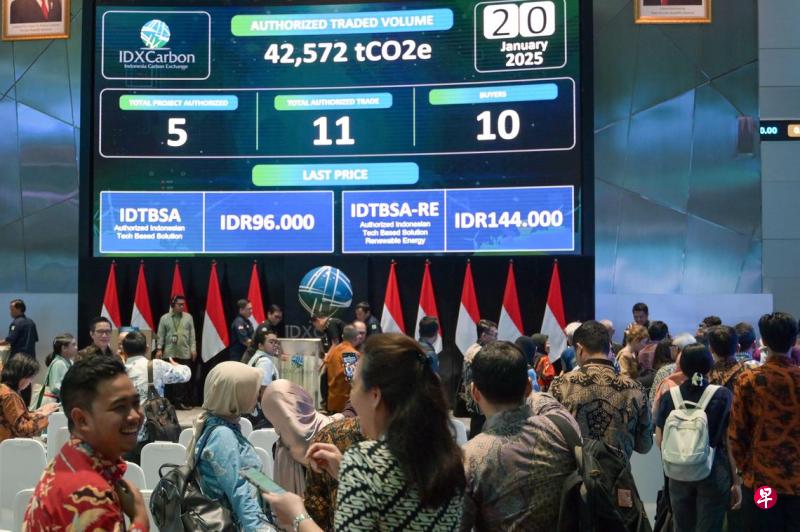
On January 20, 2025, Indonesia officially announced the opening of its carbon trading market to international investors, marking a significant step toward the country's green transformation and climate change response. As the sixth-largest emitter of greenhouse gases globally, Indonesia's carbon trading market not only holds substantial importance for its domestic economy and environmental protection but also has the potential to impact the carbon market dynamics in the Asia-Pacific region and even globally. Through carbon credit trading, Indonesia aims to raise funds to achieve its climate goals and drive green economic development. However, alongside these opportunities, Indonesia faces numerous challenges in this process.
The opening of Indonesia's carbon trading market comes at a time when global climate governance is accelerating. Since the 2015 Paris Climate Agreement, countries worldwide have been under increasing pressure to reduce emissions and address climate change. Carbon emission trading, as a market-based mechanism for emission reductions, has become an essential tool for nations in tackling climate change. According to the United Nations Framework Convention on Climate Change (UNFCCC) and the Paris Agreement, countries are required to take actions based on their emission reduction targets, with carbon trading markets providing a flexible and efficient way to meet these targets within the global climate framework.
For Indonesia, carbon trading is not only a means of fulfilling its international climate commitments but also an important avenue for addressing domestic environmental pressures and advancing its green economic transformation. As the largest economy in Southeast Asia, Indonesia accounts for about 2% of global greenhouse gas emissions, particularly from the energy, transportation, and agriculture sectors. According to the International Energy Agency (IEA), Indonesia's energy structure still heavily relies on coal, which presents a major challenge in responding to climate change. As a result, the Indonesian government is leveraging the carbon trading market to attract international capital, with the goal of transitioning its energy structure, accelerating the development of renewable energy, and fostering a low-carbon economy.
The launch of Indonesia’s carbon trading market has a profound and multifaceted background. First, as a signatory of the Paris Agreement, Indonesia has committed to reducing greenhouse gas emissions by 29% from 2005 levels by 2030, with an aim to achieve carbon neutrality by 2045. To achieve these goals, Indonesia needs substantial investments in green energy, improved energy efficiency, and the development of low-carbon technologies. However, given the economic growth pressures, the domestic fiscal budget and traditional government spending alone are insufficient to support such a massive funding requirement. Therefore, the opening of the carbon trading market, particularly to international investors, has become a key tool for the Indonesian government to raise green funds. Through carbon credit trading, Indonesia can not only showcase its environmental commitments to the international capital market but also direct funds toward green industries, accelerating the implementation of green technology innovations and environmental protection projects.
Despite the potential of the carbon trading market to provide a new avenue for achieving climate goals, its successful operation faces several challenges. One of the most significant risks to Indonesia's carbon trading market is market integrity. In recent years, some of Indonesia's carbon credit projects have been criticized by the international community for fraudulent reporting or data manipulation. These issues have not only damaged the credibility of Indonesia’s carbon trading market but have also raised doubts among international investors. For example, reports have pointed out that some Indonesian enterprises and projects have engaged in the double counting or misreporting of emissions data, which undermines the transparency and fairness of the carbon market.
In addition to market integrity issues, Indonesia's current economic situation also puts pressure on the smooth development of the carbon trading market. Indonesia’s economic recovery has yet to fully overcome high inflation and fiscal deficits. In 2023, Indonesia's GDP growth showed signs of recovery, but economic growth still faces challenges due to energy price fluctuations, global supply chain issues, and weak domestic demand. Meanwhile, Indonesia’s infrastructure development remains severely lagging, especially in remote and rural areas, where there is insufficient green investment and sustainable infrastructure.
International investor confidence is crucial to the future of Indonesia's carbon trading market. However, due to insufficient transparency in the market and domestic economic challenges, some international investors have expressed cautious attitudes toward Indonesia’s carbon trading market. The authenticity of carbon credits and the long-term stability of the market are among the most critical concerns for investors. If Indonesia fails to effectively address these issues, it could lead to insufficient capital inflows, which would ultimately impact the scale and influence of the carbon trading market.
In the face of these challenges, the Indonesian government needs to adopt a series of policy measures to ensure the smooth and long-term operation of the carbon trading market. First, the government must strengthen regulation of the carbon market to ensure the authenticity and transparency of carbon credits, establishing a robust carbon credit accounting system. Enhancing cooperation with international climate organizations is also necessary to ensure the standardized operation of Indonesia's carbon market.
Second, Indonesia should actively promote green technology innovation and the development of renewable energy to reduce dependence on fossil fuels and accelerate the green economic transformation. The government can attract more green investments by providing policy incentives, fiscal subsidies, and tax breaks, driving the research, development, and application of low-carbon technologies.
Lastly, Indonesia should strengthen its connections with carbon markets across the Asia-Pacific region and globally, expanding the scale and influence of the market. By linking up with the carbon markets of other countries, Indonesia can enhance its position in global climate governance and attract more international capital into carbon credit trading.
Overall, Indonesia’s opening of its carbon trading market is an important milestone, providing new opportunities for the country’s green transformation and the achievement of its climate goals. However, the success of the market depends on the implementation of effective policies, ensuring market integrity, and restoring investor confidence. Given the growing urgency of global climate governance, Indonesia must overcome its current economic challenges, strengthen market regulation, promote green investment, and ensure that the carbon trading market remains transparent, fair, and efficient. Only then can Indonesia carve out a place for itself in the global green transformation wave and contribute to the collective goal of combating climate change in the Asia-Pacific region and beyond.

The European Commission released a package of measures for the automotive industry on Tuesday (December 16th), proposing to relax the requirements related to the "ban on the sale of fuel vehicles" by 2035.
The European Commission released a package of measures for …
Venezuela's Vice President and Oil Minister Rodriguez said …
On December 16 local time, the Ministry of Space Science Ex…
Recently, a highly anticipated phone call between the defen…
Right now, the world's major central banks are standing at …
Recently, according to Xinhua News Agency, the news of a tr…